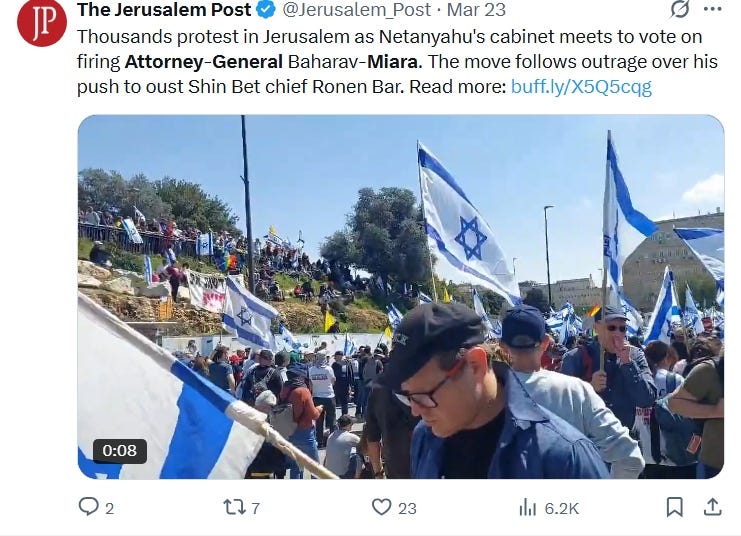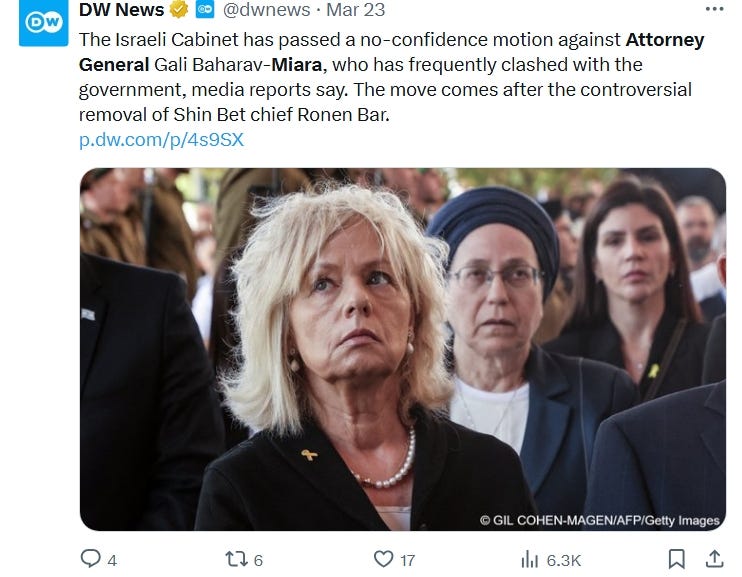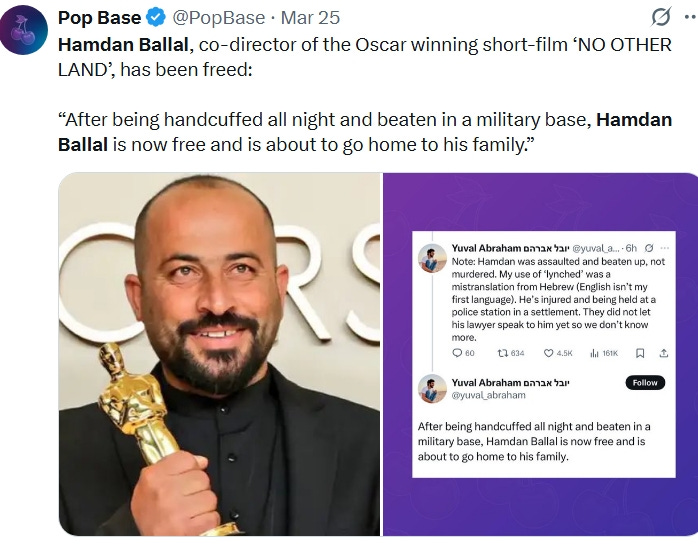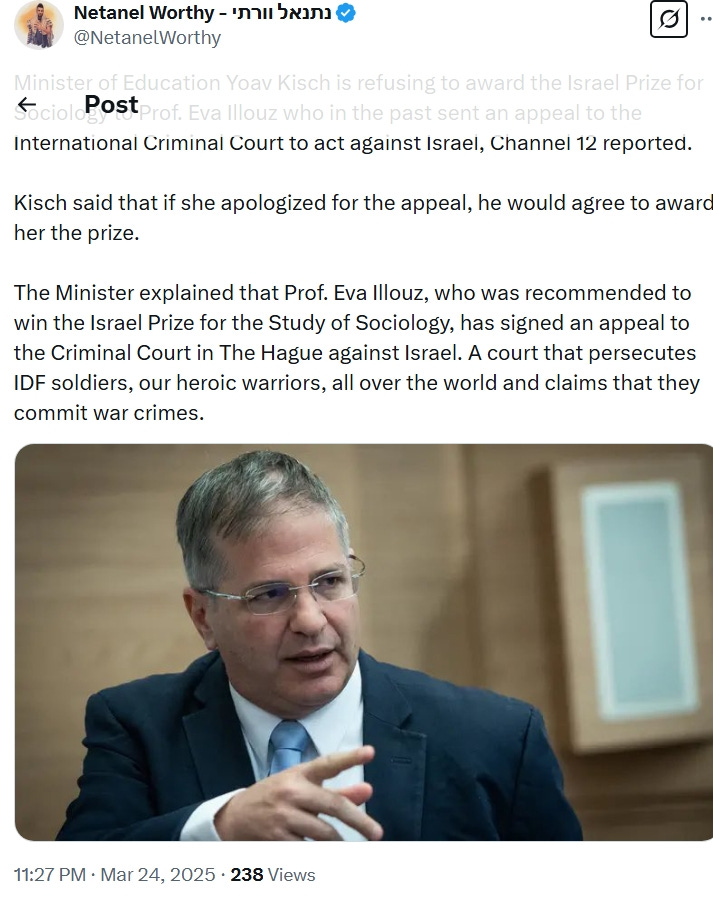Israel at War - Day 538
1. Knesset Votes on 2025 State Budget, Minister Goldknopf Resigns from Minor Position in PM’s Office, Law Approved that Will Politicize Judicial Appointments
Earlier this week, the Knesset approved the 2025 state budget by a large majority of 66 for and 52 against. The vote took place a week before the final deadline set by law, thus avoiding the dispersal of the Knesset and new elections, it also secured the stability of Netanyahu’s government for at least another year.
The NIS 620 billion budget increased by 16% over last year and projects a fiscal deficit of 4.9% of GDP. "This is a budget of war, and with God's help it will be a budget of victory," Finance Minister Bezalel Smotrich said moments before voting on the budget began.
The approval of the budget, which includes cutbacks in social services and benefits to reservists on the one hand, and additional allocations to Haredi institutions, while there is a de facto exemption from military service for Haredi men, sparked a public uproar and criticism. Thousands demonstrated outside the Knesset as the votes were taking place.
Against the backdrop of the public controversy surrounding the exemption from mandatory military service for Haredi men, Yitzhak Goldknopf, the chairman of the ultra-Orthodox United Torah Judaism party, resigned from his secondary position as a minister in the Prime Minister’s Office. While Goldknopf cited the government’s lack of progress towards passing a bill exempting yeshiva students from military conscription as the reason for his resignation, analysts claim that it was the public uproar caused by a video that went viral, showing Goldknopf dancing to an anti-enlistment song at a wedding.
The resignation, however, is mostly symbolic, as Goldknopf will continue to hold on to his primary position as housing minister.
This week, the coalition passed a controversial law that considerably increases political influence and power over the judicial appointment process, by changing the composition of the judicial appointment committee. The law, a centerpiece of the judicial coup, will enable, for the first time in Israeli history, the control of politicians over the judicial appointment process. According to some legal commentators, this law is even more harmful to Israeli democracy than the cancellation of the plausibility cause, passed by the government in 2023, and later blocked by the Supreme Court.
The lawassed by an overwhelming majority of 67 to 1 after all the opposition members boycotted the vote, and left the Knesset plenum in protest.
The vote came after a lengthy and stormy overnight debate after opposition members submitted more than 71,000 objections to the proposed law.
Thousands demonstrated outside the Knesset during the debate in the plenum. Several lawmakers from the opposition decided to leave the Knesset and open temporary parliamentary chambers outside the Knesset, marking a shift in the opposition leaders’ resistance to government moves.
2. As Hostage/Ceasefire Negotiations Reach a Dead-end Once Again, Civic Unrest Continues
Negotiations towards a renewed ceasefire/hostage deal have reached an impasse after the collapse of the ceasefire together with renewed Israeli military operations in Gaza. According to Egyptian sources, the negotiations reached a dead-end due to Israeli rejection of all proposals presented this past week, as Israel seeks to advance the displacement of Gazans. However, an Arab diplomatic source was quoted in a Qatari media outlet saying that the Hamas leadership rejected a proposal for a ceasefire in exchange for exiling Hamas senior officials from Gaza. A Hamas official said that "no one will accept a situation in which the agreement will only be a temporary period of calm… and after that, the fighting will resume along with plans for expulsion."
Israeli sources reported that Israel insists that Hamas releases 11 hostages in the first phase, and not five, as Hamas proposed. In a Knesset speech, PM Netanyahu vowed to increase military pressure on Hamas should it continue to refuse to release the hostages, including seizing territories in Gaza: “And I say this to Hamas – that includes seizing territory, and other things that I will not detail here." Defense Minister Katz echoed the same message in a statement, warning Gazans that the IDF's operations will expand to more areas in the Strip, saying they "will be required to evacuate and lose more and more territory. The plans are already prepared and approved."
Earlier this week, Hamas released a video of two Israeli hostages, Elkana Bohbot and Yosef Chaim Ohana. The video was the first sign of life that their families received from them since October 7th, 2023, when they were kidnapped from the Nova music festival. Bohbot’s brother told an Israeli media outlet that his brother looks lifeless, and his face swollen, possibly because he was forced to take steroids. He also called for continued public demand for the return of the hostages, saying: "We're also hostages. It's unbearable. My parents' health has severely deteriorated."
Ilana Gritzewsky, released from Hamas captivity during the November 2023 cease-fire, and whose partner Matan Zangauker is still held captive by Hamas, stated in an interview to the NYTimes that she had fainted while being taken across the Israel-Gaza border and had woken on the floor, with her shirt lifted and her pants unbuttoned, surrounded by armed Hamas militants.
Also, this week, hundreds of Gazans demonstrated against the war and Hamas in Beit Lahia, in the north of the Gaza Strip. A protester in northern Gaza told an Israeli news outlet that the demonstration began spontaneously, out of a "sense of despair, due to the inability to endure the continuation of the war." Adding, that the horizon (for the success of the protest) depends not only on Hamas but also on Israel, the PA, and the international community, including the Arab world.
The resident added that the protest "can't succeed without a horizon – and this horizon doesn't depend just on Hamas, but also on Israel, the Palestinian Authority, and the world, including the Arab world." He also clarified that the protests against Hamas do not indicate any support for Israel. Another local leader said that Gazans "want to live like all other people in the world live."
Thousand of Israelis rallied daily in Jerusalem, in support of the release of the hostages and against the government. The Hostages and Missing Families Forum issued an open statement, calling upon Ron Dermer, minister of strategic affairs and head of Israel’s hostage negotiations team to strike a deal within the next month or resign.
3. Government Votes to Oust Attorney General, Continues to Bash Shin Bet Chief
Earlier this week, in an unprecedented move, the Israeli government voted unanimously in favor of a no-confidence motion against Attorney General Gali Baharav-Miara, designed to expedite her dismissal from office. PM Netanyahu was absent from the vote, given the conflict of interest he has, since he is currently on trial for corruption charges and the attorney general serves as the state’s chief prosecutor.
In a long report prepared ahead of the vote, justice minister Levin – who spearheaded the move to oust the attorney general – cited Baharav-Miara’s “unfitting conduct” and the “substantive, and prolonged differences of opinion” between her and the government.
Baharav-Miara did not attend the session in which the vote of no-confidence was held. Instead, she issued a letter stating that while she supported 99% of the government policy and security resolutions, she voiced her objection in cases where the government sought to place itself above the law and to operate without checks and balances.
The unanimous no-confidence vote sparked public uproar and criticism from opposition members, the public, and former attorneys general. Thousands demonstrated outside the PM’s office while the session took place.
The public controversy surrounding the dismissal of Shin Bet chief Ronen Bar continues to make waves. This week, the media reported that Bar notified PM Netanyahu that the security service was investigating suspicions of the infiltration of Kahanist factions into the police force during Minister of National Security Ben Gvir’s tenure. In response, Ben Gvir, who recently rejoined the government, lashed out at the Shin Bet chief, accusing him of spying on him and the heads of the Israel Prison Service and Israel Police, and that he should be behind bars. The PM office also issued a statement on the matter, stating that the probe into Ben Gvir’s ministry is designed to “overthrow an elected right-wing government”.
4. Co-creator of Oscar Winning Documentary Beaten and Detained in West Bank
Earlier this week, Hamdan Bilal, co-creator of the Oscar-winning documentary “No Other Land”, was beaten by settlers in the village of Susiya in the West Bank and later detained overnight at the Kiryat Arba station near Hebron, along with two other Palestinian residents.
The first to report Bilal’s detention was Yuval Avraham, Bilal’s Israeli co-creator. Avraham shared that Bilal was beaten at his home in Masafer Yata near Hebron by settlers and later was taken off the ambulance he called by soldiers who were present. IDF denied Avraham’s claims and said that Bilal was detained for throwing stones at Israeli soldiers.
The video documenting the settler’s attack went viral reaching more than 20 million views and was cited by major news and media outlets around the world, including the BBC, The Guardian, AP, CNN, and leading entertainment publications such as The Hollywood Reporter, Variety, and Deadline.
Bilal was released the following morning.
5. Minister of Education Calls to Deny Israel Prize for Prof. Eva Illouz
Education minister Kisch called to deny the Israel Prize for world-renowned sociologist Prof. Eva Illouz, citing her “anti-Israel” views as the reason. This, was shortly after the committee appointed by the Ministry of Education voted unanimously to grant her the prize. Strips Israel Prize from the professor over an ICC war crimes petition she supported.
In a letter to the committee members, Minister Kisch urged the committee to reconsider Illouz’s election as a prize laureate given that she was one of the signatories on a letter to the ICC.
In 2021, the ICC announced its intention to open a probe into actions by Israel and the Palestinians in the West Bank, Gaza Strip, and East Jerusalem. In May of that year, over 180 Israeli scientists, intellectuals, and public figures – including Prof. Illouz – signed a letter to the ICC’s chief prosecutor at the time, Fatou Bensouda, urging him not to rely on Israel to investigate the accusations against it. According to Israeli media sources, ten previous Israel Prize laureates also signed the appeal.
The president and rector of the Hebrew University where Prof. Illouz teaches sent an open letter to Minister Kisch urging him to grant her the prize, since it is awarded to scholars based on their academic excellence and achievements, and not on their personal political views. The Supreme Court ruled three years ago in a similar case that the minister should not deprive Israel Prize winners of the award based on personal political views, only in very extreme cases.










